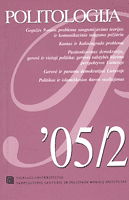Referendumai dėl narystės Europos Sąjungoje: patirtis, problemos ir pamokos Lietuvai
Referendums on the Membership in the European Union: The History, Issues and Lessons for Lithuania
Author(s): Gediminas VitkusSubject(s): Politics / Political Sciences
Published by: Vilniaus universiteto leidykla & VU Tarptautinių santykių ir politikos mokslų institutas
Keywords: Lithuanias membership in the European Union; direct democracy; European integration;
Summary/Abstract: This article has been devoted to answer the question: does Lithuania have to set up a referendum on its membership in the European Union? In this undertaking the author refers to the experience of the direct democracy and referendums concerning the European integration of the European states. A number of Lithuanian politicians, playing with a card of a forthright-understood democracy, have found themselves ready to organize such a referendum irrespective of any claims arguing otherwise. Making it look like a deadly sin, they would like to suppress any discussion on the expedience of referendums because they lack very often the necessary arguments to prove their case. The analysis helps come to a conclusion that the experience of the European Union states and its candidates in organizing the referendums and the overall experience of direct democracy is much too versatile and non-compatible. Therefore, it seems, there is no backbone for arguments saying that should Lithuania refrain from organizing a referendum on the membership in the European Union, would keep itself apart from the long-established European tradition and the practices of the European states. Quite the contrary, having in mind the expanding euro-scepticism in Europe and the failed referendums on the matters of European integration in Ireland and Denmark one may claim that Lithuanian politicians, should they want to be rational, would adhere to a position of giving-up of such a useless undertaking. Pondering on the chances of winning the referendum, the author concludes that we cannot be certain that the referendum on the membership of Lithuania in the European Union is to be won indeed. It's a risky enterprise, - the author puts it clear. He names two reasons why it is: the first one is based on the fact that in Lithuania the number of those in favor of country's membership in the community keep around 50 percent. Thus, given the very strict and high regulations embedded in the Law, there is a great likelihood that in terms of winning the referendum, it would either not take place at all, or it would result in a negative outcome. The second reason is the history of referendums being held in Lithuania. There were seventeen referendums so far held in Lithuania. However, the provisions of only three of them received the necessary support of the electorate. The last successful referendum was held in 1992, and it was the Constitution being approved therein. (…)
Journal: Politologija
- Issue Year: 2002
- Issue No: 1 (25)
- Page Range: 2-20
- Page Count: 19
- Language: Lithuanian

